Desert landscaping ideas: 8 stunning ways to create a verdant oasis in your yard
Our edit of desert landscaping ideas is full of expert tips to help you bring out the best in a hot and arid environment

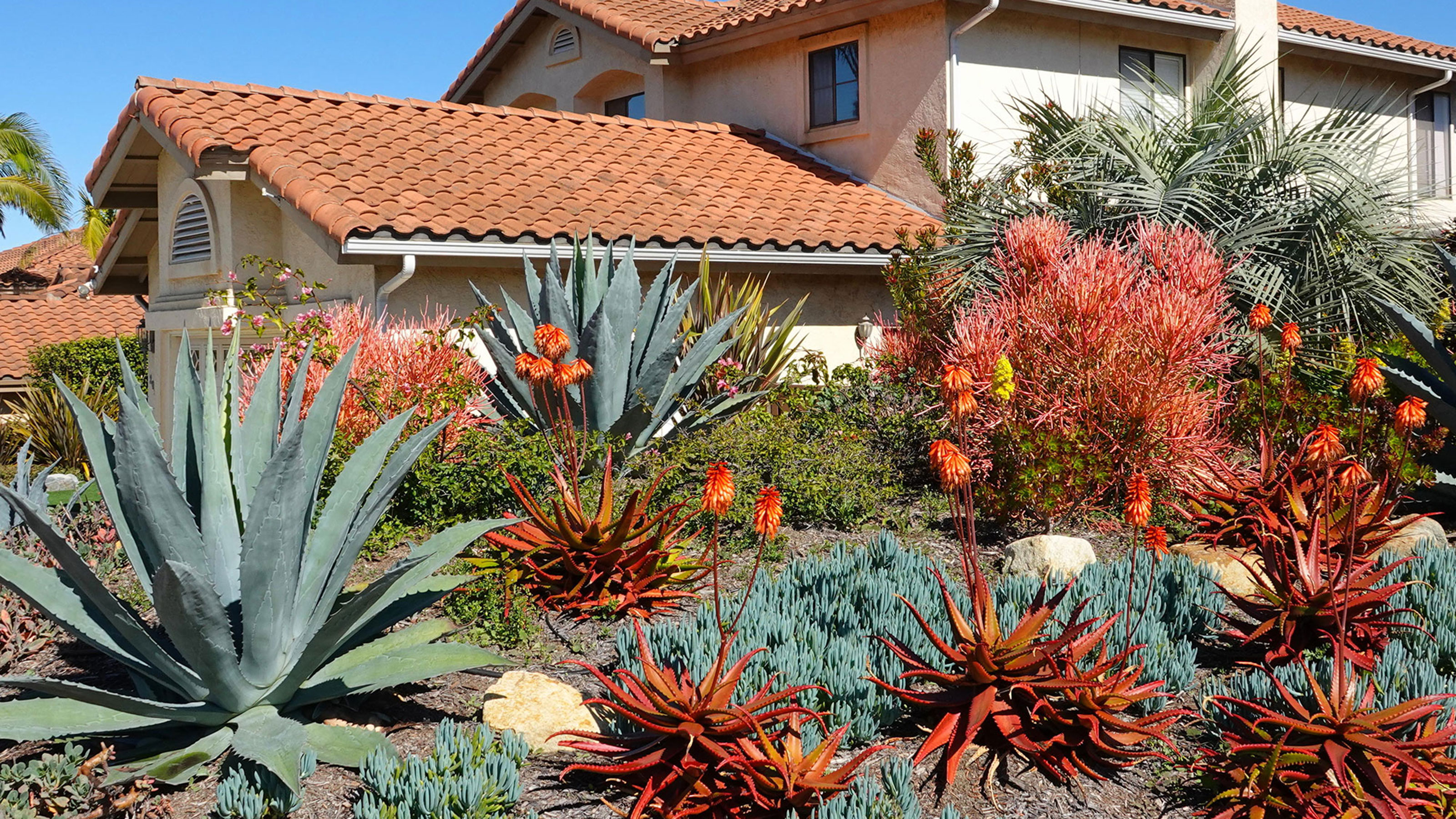
The most successful desert landscaping ideas are a mix of sculptural native plants that make a dramatic statement when combined with natural materials such as stone, pebbles and boulders. Featuring an earthy color palette in shades of soft red, peachy terracotta and sand, it can make for a striking backyard scheme.
Desert garden designs take inspiration from the shapes, textures and light of the surrounding landscape to create something that segues perfectly into the natural setting and looks like it's been there for ever. This combination of elements lends itself to some dramatic landscaping ideas with statement plants and stark outlines so it's time to get bold with your design choices.
'Creating a desert garden can be an incredibly rewarding experience, with beauty and practicality combining to create a truly amazing outdoor space,' says Oberon Copeland, CEO of Very Informed, who is based in Phoenix, Arizona. 'With its low maintenance requirements and diverse array of hardy plants, cacti and succulents, a desert garden can thrive in even the harshest climates.'
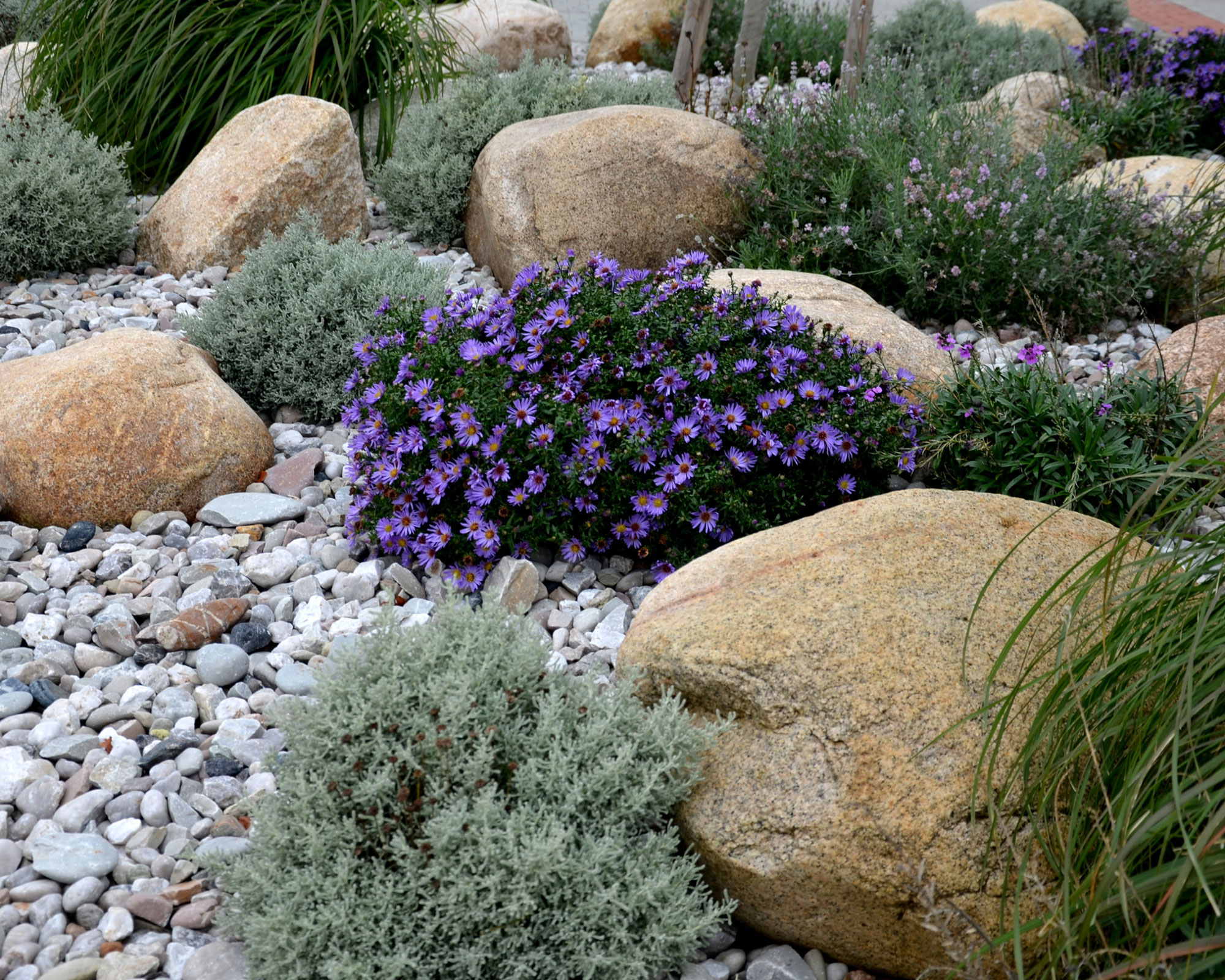
This ornamental desert flowerbed features boulders and pebbles together with a variety of desert planting including Chinese fountain grass, purple amellus and santolina
8 inspirational desert landscaping ideas to try
Creating a garden oasis in an arid climate can be possible if you chose the right combination of plants and landscaping materials. You will need to think out of the box, however, since most traditional garden styles won't work. Instead, turn to more drought-friendly solutions such as xeriscaping or landscaping with gravel.
'When planning your desert landscaping, think of big-sized plants that are tolerant to high temperatures and adapted to water conservation so that they can survive in the harsh environment,' says professional gardener and owner of Jardin Tienda Miguel Palma. 'Tend to the plants with care and they will thrive regardless of the desert conditions.'
1. Go native with your plant selection
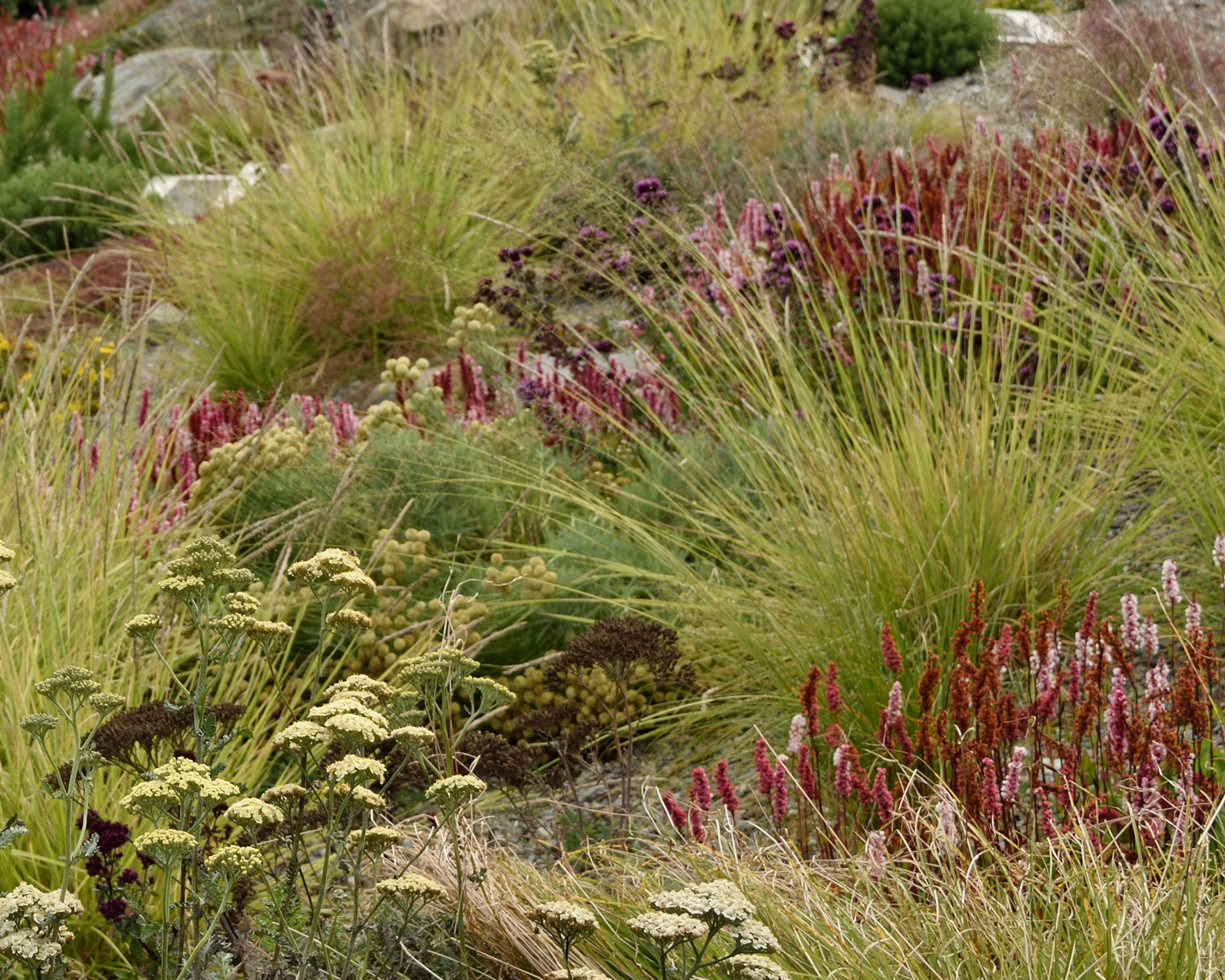
Drought-resistant ornamental grasses and certain types of perennial thrive as part of a desert planting scheme
The best desert landscaping ideas use native plants, but you may also use adaptable species from the surrounding area. 'Many sedums and sempervivum, including hens and chicks, will flourish in rocky gardens and pots, and ice plant is an excellent choice for ground cover,' says Aaditya Bhatta, horticulturalist at Plantscraze.
Use drought tolerant plants that can withstand lengthy periods without watering. Aaditya suggests choosing self-sustaining plants like the vertical gray desert spoon (Dasylirion wheeleri) and the shrubbier turpentine bush (Ericameria laricifolia), as well as creosote bush and honey mesquite.
Put dramatic sculptural plants and expensive varieties where people will notice them the most. Pick tall plants like acacia, mesquite, and desert willow if you want to provide shade. For information on native plant sales and desert garden inspiration, contact your local extension department.
Wherever possible, use a rain barrel to collect rainwater for irrigation.
2. Make cacti and succulents a focus of your desert scheme
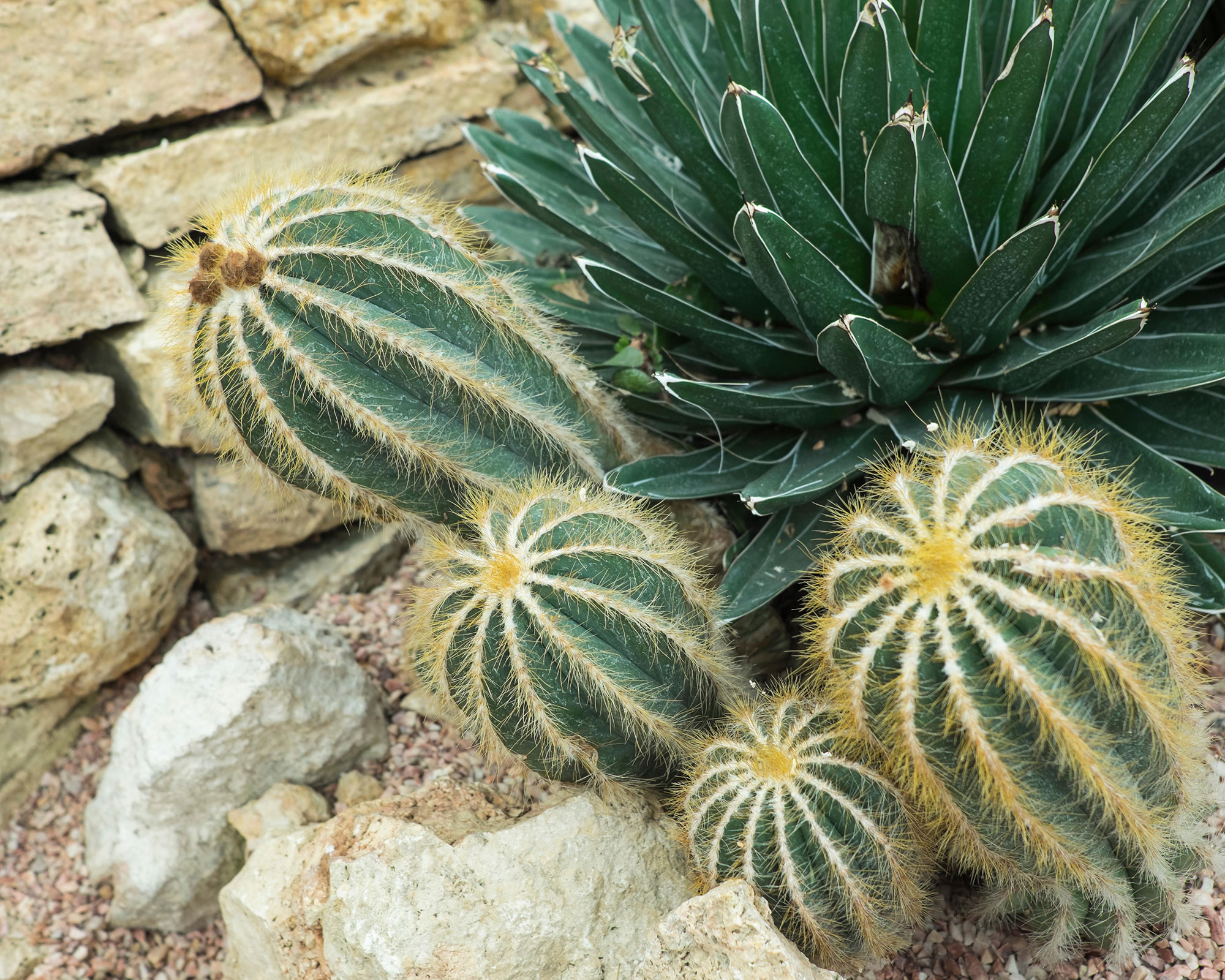
Queen Victoria agave (Agave Victoria reginae) and ball cactus (Parodia Magnificia)
There are some classic plants that deserve to be included in all desert landscaping ideas. Choosing a combination of succulents and cacti always works well. 'Planting succulents and cacti in your yard is an excellent way to spruce it up,' says botanist Jennifer Green of Postive Bloom. 'You can create a line of agave that follows your pathway, or plant aloe vera in raised garden beds for more texture.'
Cacti are, of course, the quintessential desert plant. 'They are easy to care for and can provide a beautiful focal point for a desert garden,' says plant expert James Rivenberg of Plant and Pest. Cacti come in a variety of sizes and shapes, so it’s easy to find a variety to fit any space.
'Consider bringing different leaf shapes, sizes, and textures into the mix when landscaping with cactus,' suggests Taylor Galla of GardenAider. 'The zebra cactus offers striking contrasting colors, while the golden barrel gives that cool globular look so familiar in desert gardens. Meanwhile the bunny ear cactus brings something different entirely, adding interesting height to your combination of cacti.' For an added pop of color, consider adding some cacti like prickly pear, hedgehog cactus, or dragon fruit.
Succulent garden ideas are another great option for a desert-style space since these plants are able to store water in their leaves. 'They come in a variety of shapes and sizes, so there’s something to fit any space,' says James. 'Find out how to grow succulents and you'll see they’re also low-maintenance and able to thrive in dry climates.'
Popular succulents for desert gardens include aloe vera, jade, and agave. 'The best succulents for desert gardens are hens and chickens, ghost plants, paddle plants, and aloe vera,' according to Taylor. Another good choice is agave, a type of succulent that is easy to care for and can grow up to six feet tall, creating a dramatic focal point in a desert garden.
3. Add suitable trees to create shade and structure
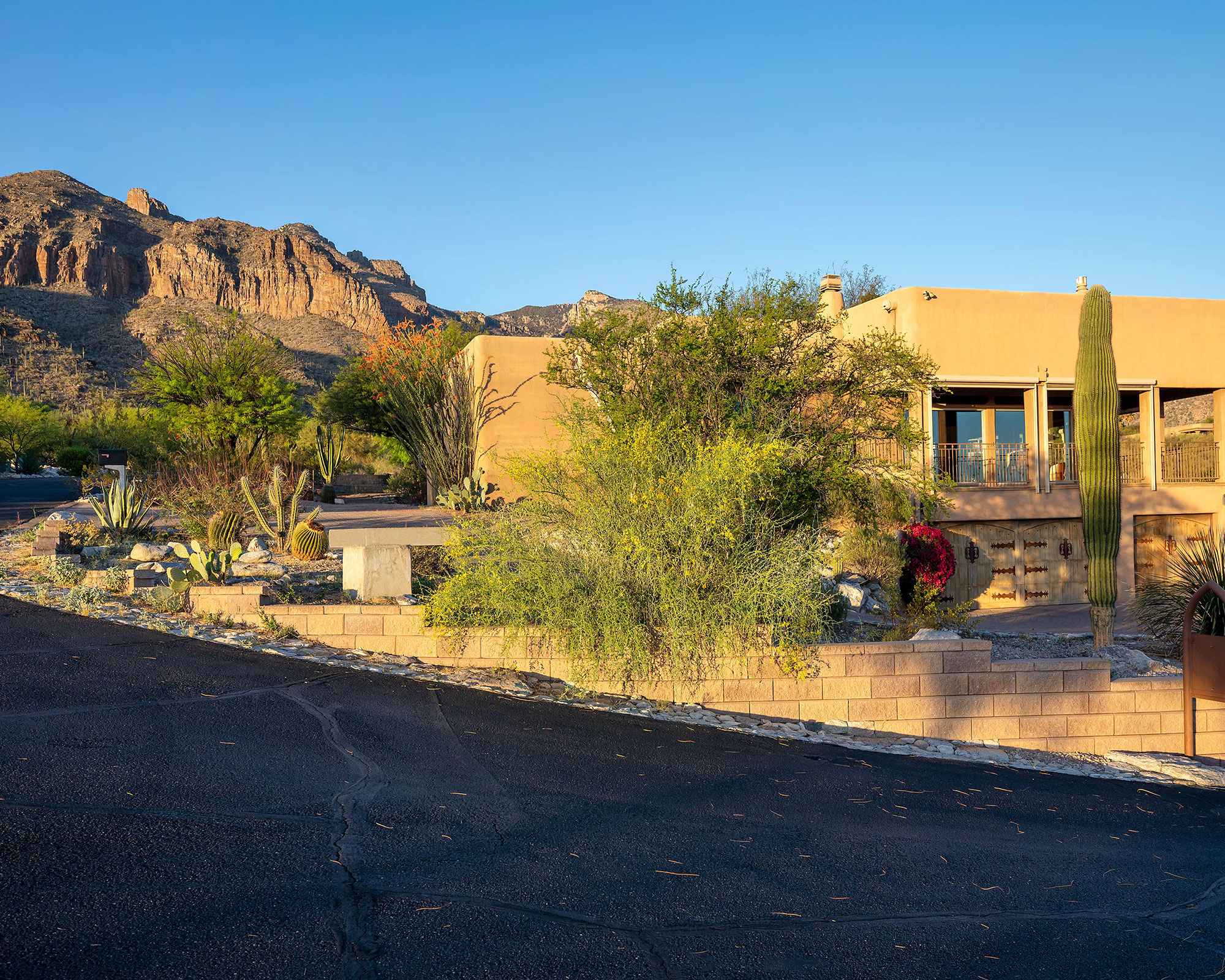
Trees with strong sculptural shapes look best in desert garden designs
If you’re looking to get a little more creative with your desert landscaping, consider adding a few trees to the mix. This can add height and variety to your landscape, at the same time providing some much-needed shade and privacy.
There are many varieties of drought tolerant trees, including mesquite, creosote, and palo verde, that are native to the desert, so you can be sure to find something that will fit your climate and style. Trees can provide a home for wildlife too.
'When landscaping your desert garden, it's important to use trees that are suited to the climate and the soil type,' says gardening expert Lindsey Hyland of Urban Organic Yield. 'Palo verde, mesquite, and acacia trees are all good choices for a desert garden. They create a natural windbreak and help prevent soil erosion.'
Joshua trees and other yuccas can also be a great addition to your desert landscape. 'You can combine them with succulents and earth-colored stones or use them as a centerpiece of your garden design,' says botanist Jennifer Green.
4. Include textural grasses in a desert planting scheme
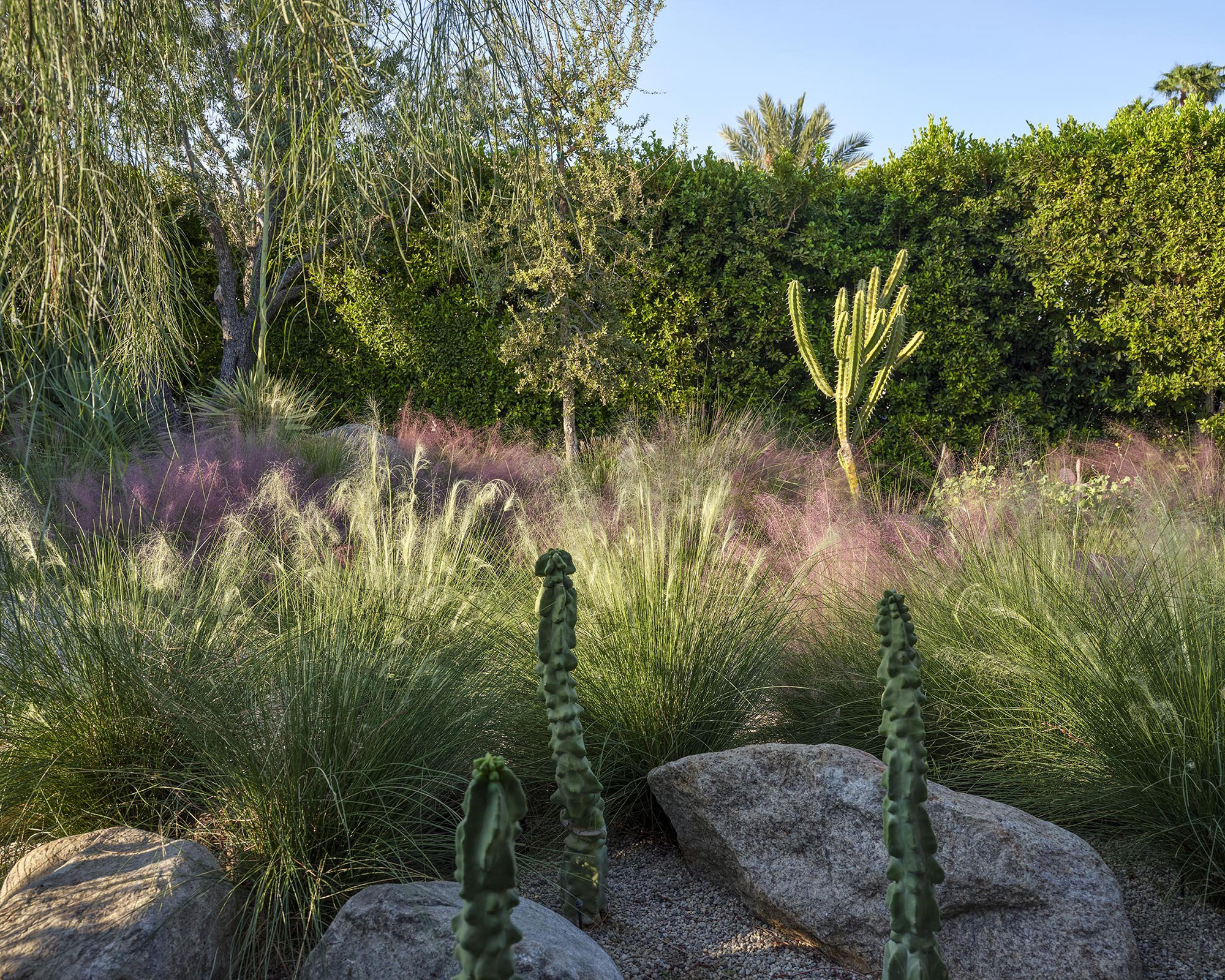
This desert garden design by San Francisco-based landscape architects Surfacedesign, Inc is in Palm Springs and uses trees, soft pink ornamental grasses, cacti and boulders with beautiful results
Grasses are a great addition to a desert garden, as they add texture and movement to the landscape. 'Popular grasses for desert gardens include blue grama grass and buffalo grass,' says Taylor Galla. 'These plants are low maintenance and will provide your desert garden with the perfect finishing touch.'
Landscaping with grasses is a good choice for desert gardens as they are able to thrive in hot, dry climates too. There are many varieties of grasses that are native to desert climates, so it’s easy to find something that will thrive in your yard.
'Our Casa de las Ardillas project in Palm Springs uses a mix of soft drought-tolerant grasses that move with the wind, accented with more sculptural cacti and succulents to create dramatic vignettes within the garden,' says Michal Kapitulnik of San Francisco-based landscape architects Surfacedesign, Inc.
The pink muhly grasses used throughout this garden create a soft seasonal pink glow that echoes the dramatic Palm Springs sunsets. A combination of palo verde, olive and fruit trees create dappled shade throughout. 'We worked with the landscape contractor to source local gravel and boulders to accent the planting,' adds Michal.
5. Lift a muted desert palette with pops of color
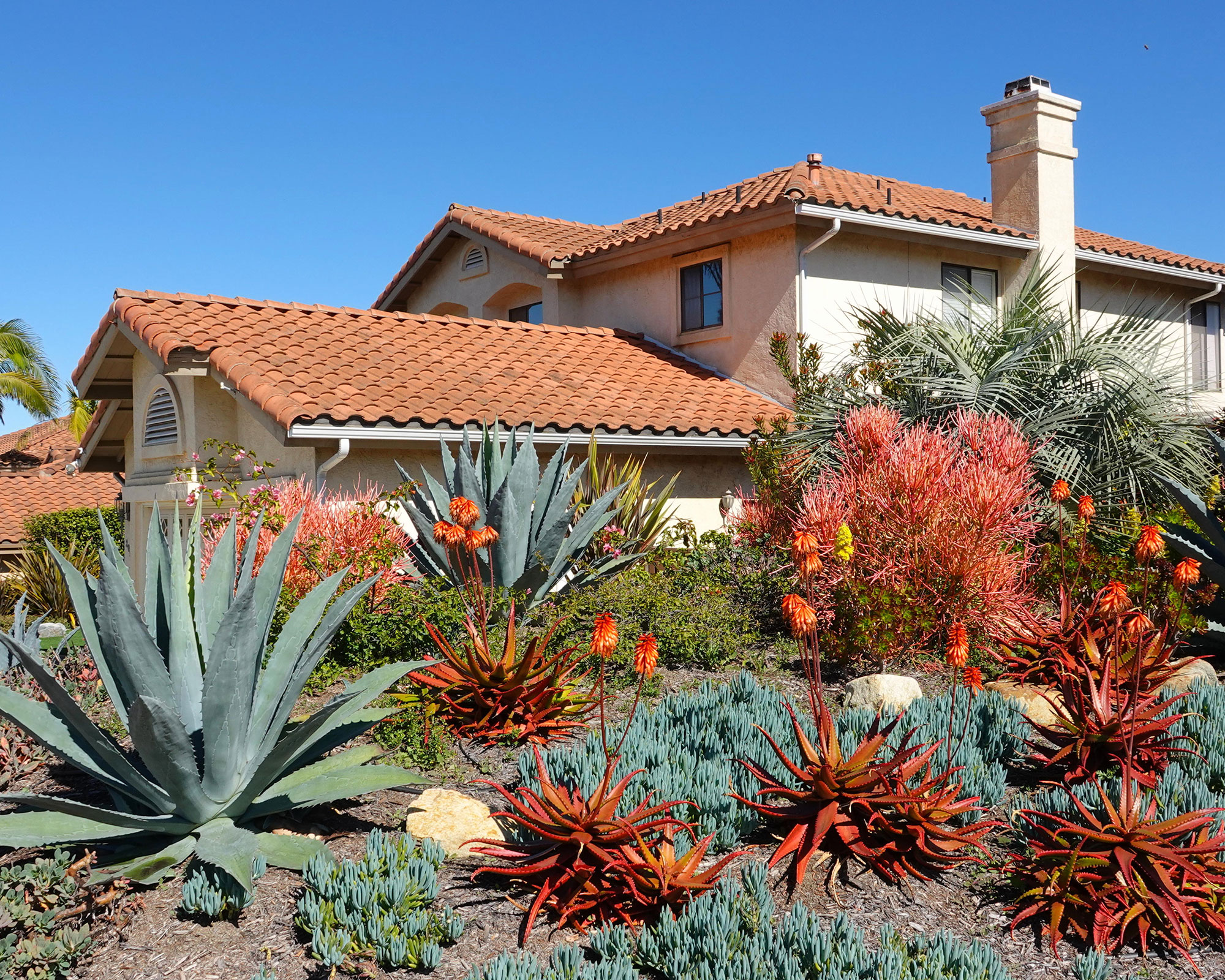
Many desert plants feature a color palette of soft gray and green so adding red highlights really makes things pop, as in this California garden
When creating a garden in a desert climate, it’s important to incorporate color. Look for plants with bright colors and interesting textures that will add life and vibrancy to your design. 'Consider adding wildflowers, different types of ornamental grass, and flowering perennials to your desert landscaping ideas to introduce a splash of color,' says James Rivenburg.
Wildflowers are a great option for a desert garden, continues James. 'They’re able to thrive in dry climates and add a pop of color to an otherwise dull landscape. There are many varieties of wildflowers that are native to desert climates, so it’s easy to find something that will thrive in your garden.' Wildflowers like Mexican poppies are a great choice as they attract bees.
Color is also a vital part of landscaping because it can be used strategically. 'Annuals are a good option for adding a burst of color to a desert garden' says Taylor Galla. 'Popular annuals include marigolds, several types of zinnia, and snapdragons. These plants will bloom for a season then die, but they provide your garden with a stunning display of vibrant color.'
Horticulturalist Aaditya Bhatta also has some favorites when it comes to adding color. 'Prickly pear cacti bloom in spring with yellow flowers, while the paddles turn purple in winter after bearing scarlet fruits in the summer. Lavender Spice Poliomintha, a Mexican oregano shrub with pink blossoms, offers scent, blooms, and waxy evergreen foliage.'
6. Plant up containers to continue the desert theme
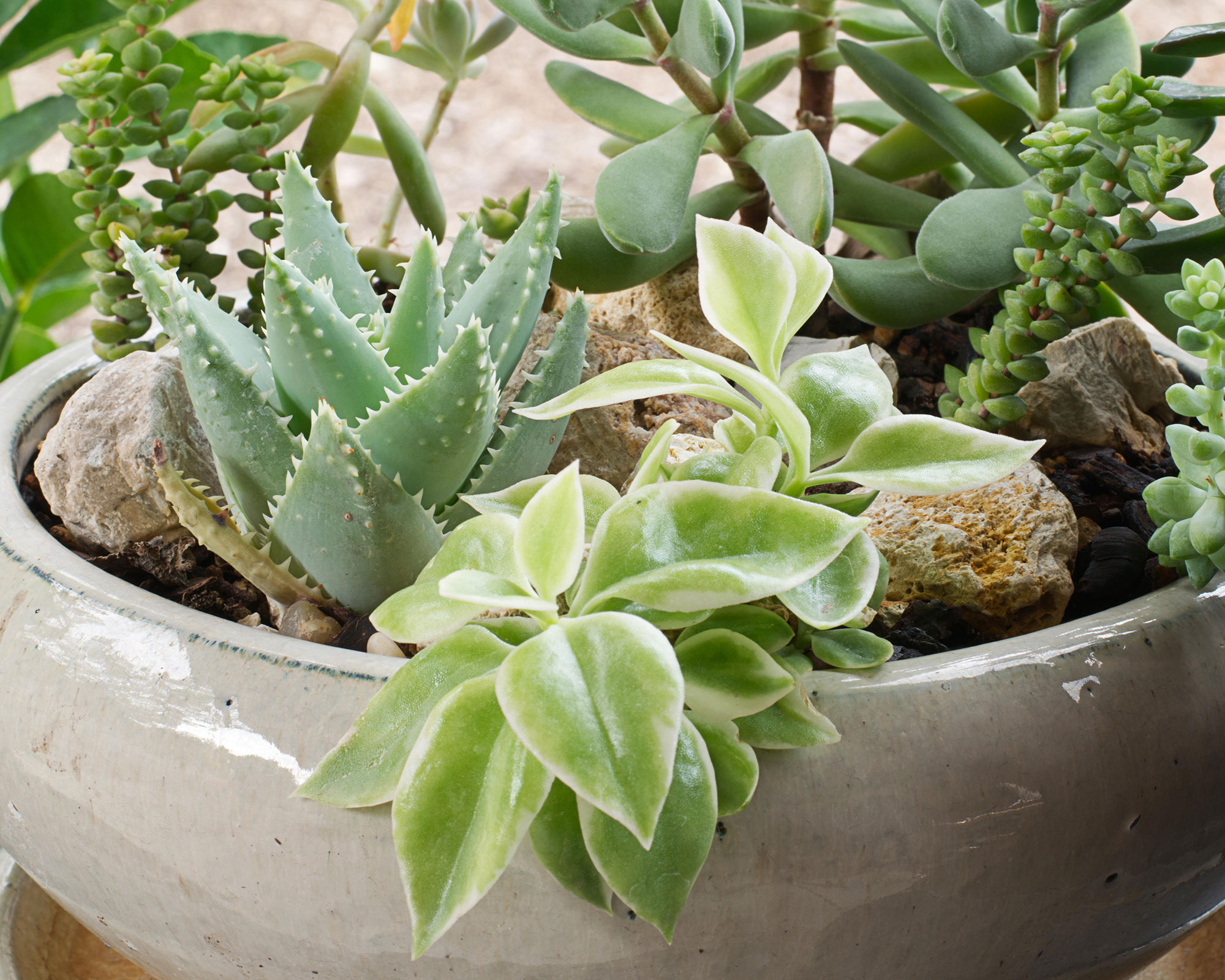
Succulents love a shallow bowl-shaped container
Large planters used as part of your container gardening ideas can add texture and interest to your desert landscaping. 'Use them to decorate your patio, bring life to a stony pathway, or frame the front door,' says Jennifer Green.
Another thing to consider is reusing old materials as planters. 'You can turn an old bike into a centerpiece of your backyard and fill the basket with cute little cactuses,' suggests Jennifer. 'Transform whiskey barrels into unique tables or planters, and pack water cans with zebra plants. You can paint these improvised pots in different colors and improve the look of your garden tremendously.'
Make sure you choose appropriate garden planters though. 'Opt for terracotta pots instead of plastic ones,' says Kerry Sherin, consumer advocate at Ownerly. 'This material absorbs heat during the day and releases it at night, helping keep root systems cool even during scorching summer days.'
7. Choose complementary landscaping materials
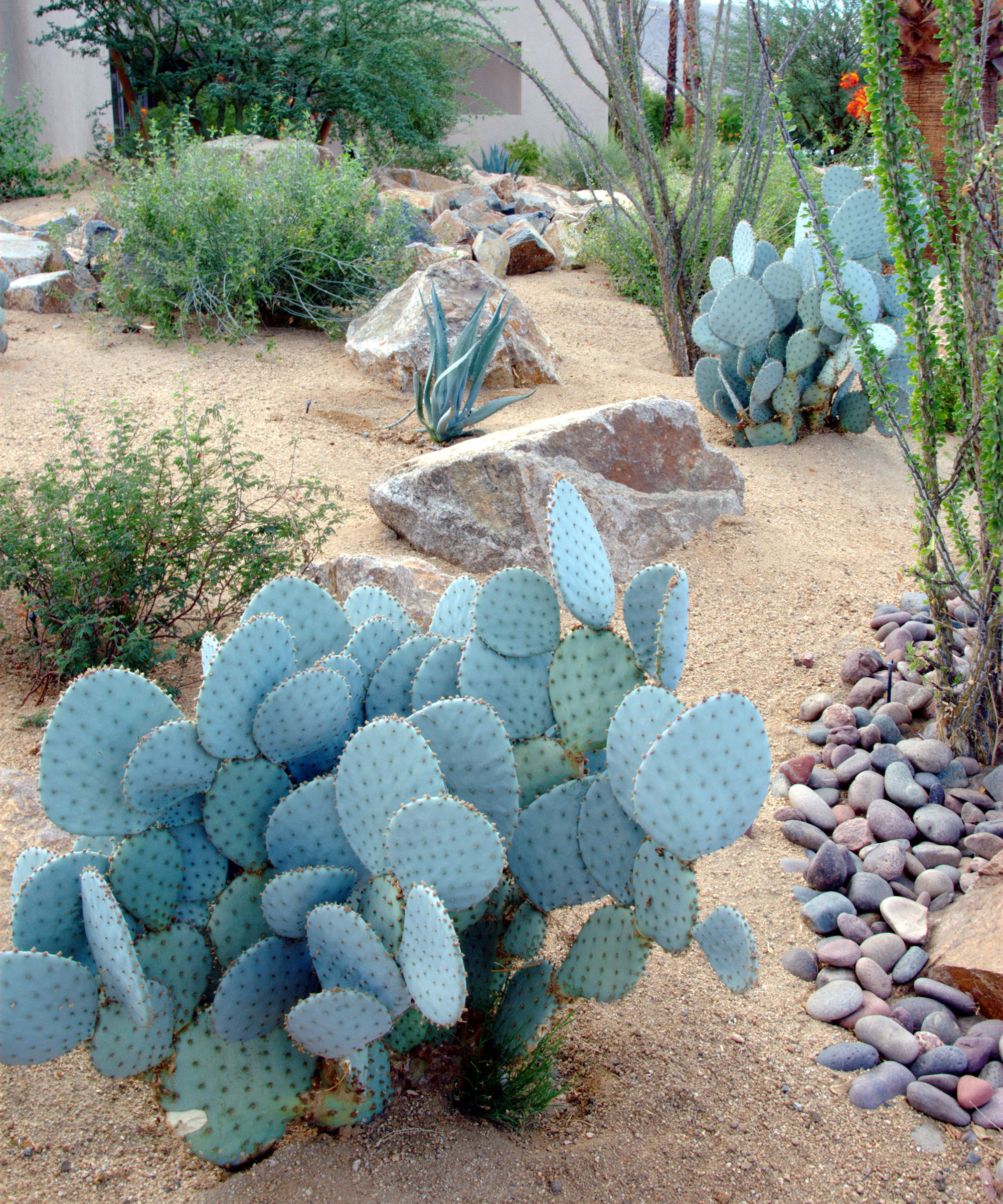
Santa Rita Prickly Pear is set off perfectly in a sand, boulder and pebble design
When designing your desert garden remember that the hardscaping should always complement the planting. 'If you would like a more natural feel, try using stones and rocks to create pathways or an outdoor seating area,' says Jen Stark, founder of Happy DIY Home. 'Additionally, consider adding some hardscaping items, such as benches or fire pits, which can add another layer of interest to your garden.'
It's important to plant a desert garden appropriate for the environment, so instead of a water-guzzling lawn think about landscaping with sand or other materials instead. 'Landscaping with boulders, gravel and drought-tolerant ground cover plants should take the place of conventional grass,' says Aaditya Bhatta.
Choose ground-cover plants such as jasmine to replace the lawn or try landscaping with pebbles by scattering small stones on the ground. 'Another thing that can help you create a unique garden is building small dunes of sand and a little oasis in the middle,' suggest Jennifer Green.
Finally, try landscaping with river rocks to create a rocky pathway or a river bed built of rocks and stones that will truly make your desert garden stand out. 'Rocks are important in a desert garden as they help to retain moisture and keep the soil from drying out,' says Taylor Galla. 'Choose rocks that are native to the area or that are of similar color and texture. This will help give your garden a more natural look.'
8. Prepare the soil for your desert garden to thrive
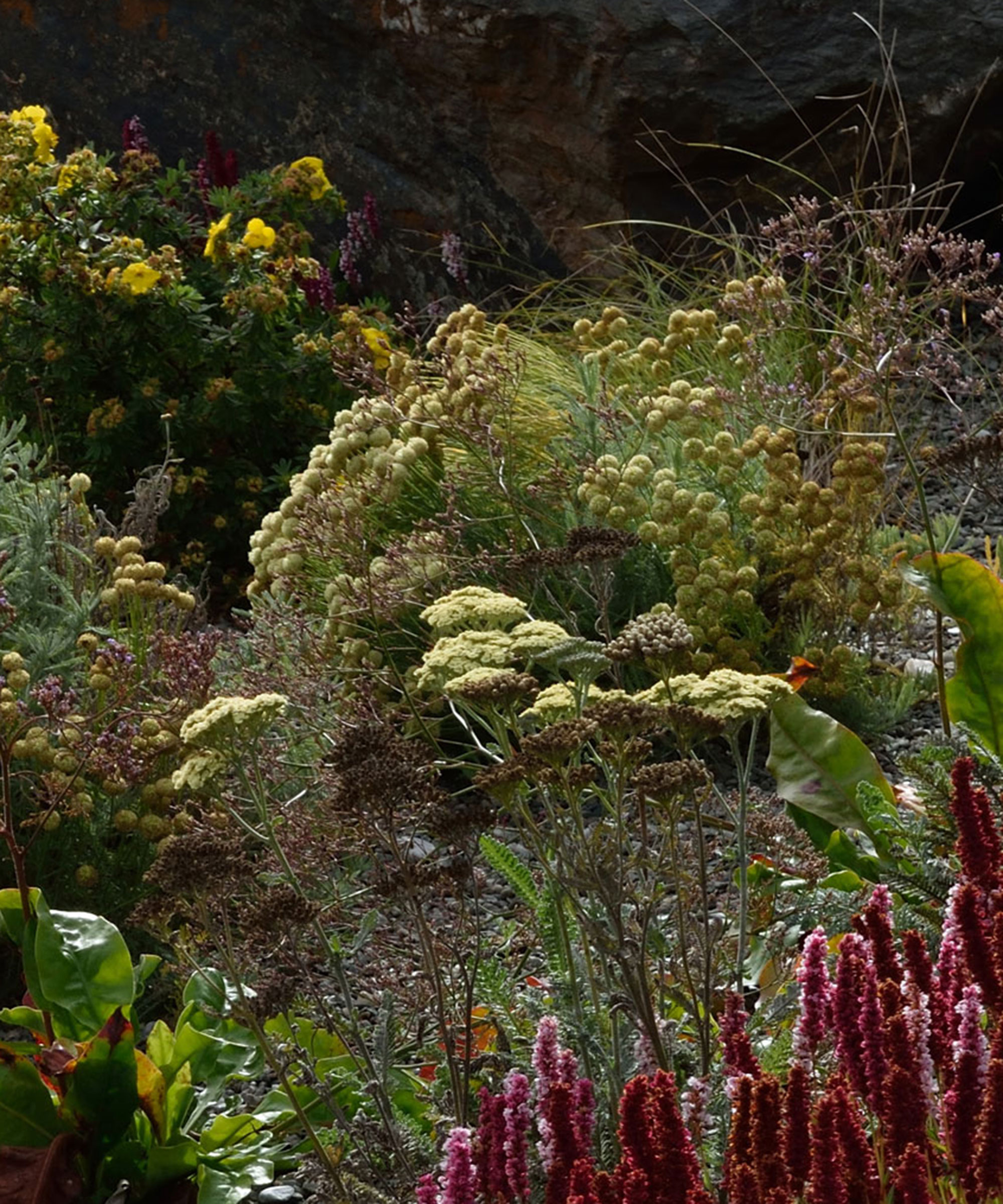
Gravel is the best friend of desert plants, particularly when used as mulch
An important factor when creating a desert landscape is the soil. Your plants won't thrive if they're not planted in compatible soil types.
'For a recent garden design we worked on the alkaline soil was nutrient-poor so we selected plants that would thrive in a low fertility medium with sharp drainage,' says garden designer Rachel Bailey. 'Importantly, we tried mulching the ‘soil’ with a 4 inch depth of gravel. This encourages deep and extensive rooting into the ‘soil’ below to allow them to obtain both nutrients and water. This will help the plants to be resilient in times of drought.'
'Desert soil is typically extremely alkaline, with a pH of around eight or above,' explains landscaping expert Emma Loker of DIY Garden. 'The best way to make your soil more alkaline is to purchase some powdered lime and mix it right in with the soil. Get yourself a pH testing kit so you're not guesstimating your soil's pH, as this will likely lead to desert garden disasters.'
When it comes to a desert landscaping ideas, soil is key, agrees Taylor Galla. 'The soil in the desert is usually quite dry and sandy, so it’s important to know what kind of soil you have before you start planting. Once you know what type of soil you’re dealing with, you can start adding nutrients to help the soil retain more moisture.'
If you want to avoid landscaping mistakes be sure your soil is fit for purpose so your plants will thrive.
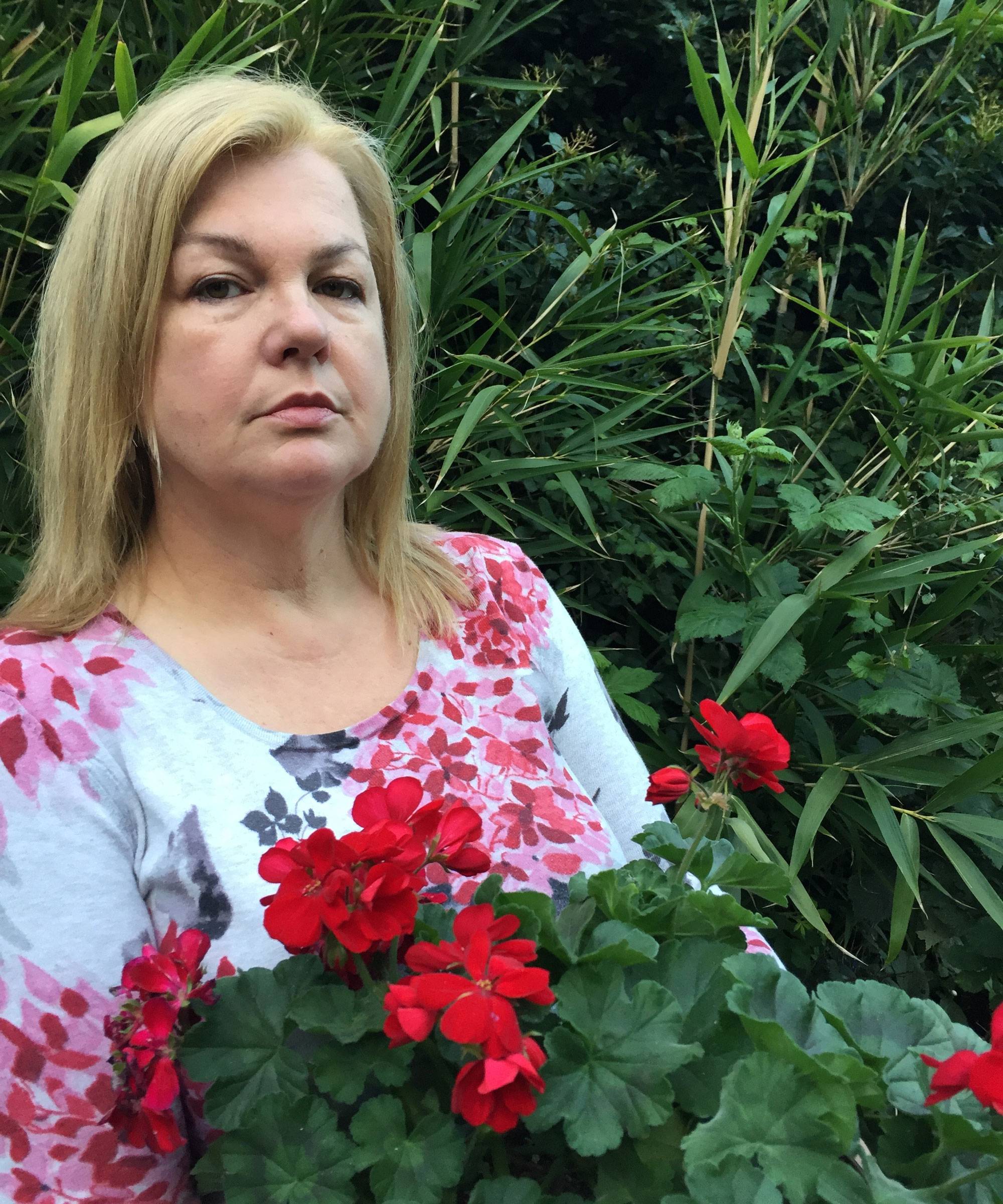
Lifestyle journalist Sarah Wilson has been writing about gardens since 2015. She's written for Gardeningetc.com, Livingetc, Homes & Gardens, Easy Gardens and Modern Gardens magazines. Having studied introductory garden and landscape design, she is currently putting the skills learned to good use in her own space where the dream is establishing a cutting garden.
